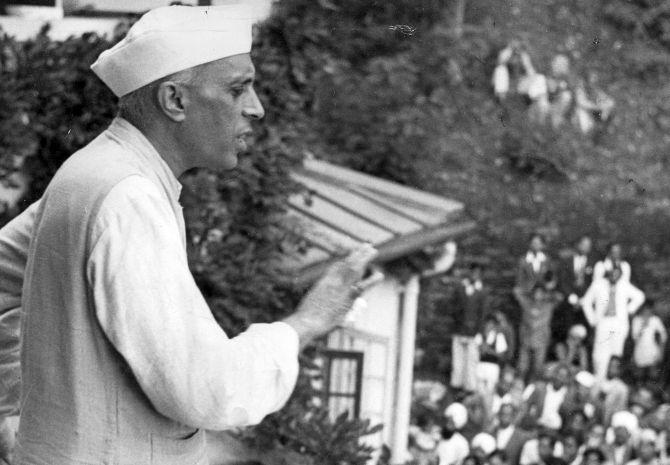'The Kerala saga also requires a reappraisal of Nehru himself.
'The real Nehru is to be found somewhere between the syrupy panegyrics on him and the demonisation of him that is currently happening,' says Ambassador MK Bhadrakumar.

July 31, 2019, Thursday, marked the 60th anniversary of the dismissal of the communist government in Kerala.
It is a poignant occasion to do some reality check on the democratic foundations of the Indian State.
Clearly, it is apparent to the naked eye that the foundations are wobbly today and the democratic culture has shrunk.
The blame is largely put on the present ruling Bharatiya Janata Party and its mentors.
But the events in 1959 serve to remind us that the decadence in India has deep roots.
To recap, the ruling Congress Party at the Centre in the '50s blatantly used the central government machinery to destabilise the elected communist government led by chief minister EMS Namboodiripad which came to power in 1957.
From day 1, attempts were afoot to engineer defections from the ruling alliance in Kerala.
When these attempts failed, an agitation under the rubric ‘Vimochana Samaram’ (liberation struggle) was orchestrated by the Congress party in alliance with all sorts of reactionary and obscurantist forces to oppose tooth and nail the progressive reforms undertaken by the communist government -- land reform, legislation to delimit the free run of religious and private bodies in the field of education, enactment of laws for minimum wage for workers and so on.
Until today, the United States has imposed restrictions on ‘declassifying’ the archival materials pertaining to that period in Indian-American relations.
But there are enough indications to suggest that the US intelligence actively contributed to the Congress party’s strategy -- and collaborated with it -- to destabilise the Kerala government.
This is a rare instance where the US keeps an Iron Curtain on its India archives.
From an American perspective, this was understandable, perhaps, since the Eisenhower administration had communism in its crosshairs and the Cold War was approaching its high noon.
However, it was abominable that Nehru and the Congress party saw nothing wrong in consorting with the US intelligence, while professing adherence to India’s strategic autonomy.
It is entirely conceivable that India’s tacit (or otherwise) connivance with the CIA to destabilise Tibet through the '50s must have had something to do with their camaraderie in a joint enterprise to overthrow the communist government in Kerala.
(The upheaval in Tibet in 1959 led to the Dalai Lama’s arrival in India in April that year.)
Coincidence or not, there was an unseemly hurry in overthrowing the communist government on July 31, 1959.
The central government had demanded from the pliable governor in the state capital, Trivandrum, a report recommending the dismissal of the Kerala government.
But those were days when Trivandrum had no direct air link to New Delhi and, therefore, the governor was called upon to dispatch his report by plane via Madras, which entailed an additional day’s delay in reaching the document to the central government.
The Nehru government was in such tearing hurry that it instructed the Intelligence Bureau (IB) to read out on the phone the governor’s report so that the President’s proclamation imposing central rule in Kerala didn’t have to be delayed by an additional day.
The blatant use of the IB as an appendage of the Congress party has a long history, isn’t it?
When the Congress party is undergoing therapy in the ICU today, it deserves sympathy, but the fact of the matter is that the party’s Jekyll and Hyde personality became unsustainable over time -- professing concern for the welfare of the downtrodden but serving elitist interests while in power, professing modernity and secularism but hobnobbing with reactionary and obscurantist elements, professing abiding faith in political pluralism but inherently intolerant and vindictive toward the opposition.
At some point by the second half of the '60s already -- hardly two decades into independence -- people increasingly began to suspect the Congress party’s true identity, namely that it was a party without an ideology.
Indeed, the Kerala saga also requires a reappraisal of Nehru himself.
The real Nehru is to be found somewhere between the syrupy panegyrics on him and the demonisation of him that is currently happening.
At the epicentre of the ‘liberation struggle’ were extraordinarily progressive reforms that the communist government in Kerala pioneered.
In particular, an education bill introduced by EMS soon after assuming his post, envisaged better wages and working conditions for the teachers in private schools and colleges.
Unsurprisingly, the reform annoyed entrenched interest groups -- the Catholic Church and the Nair community, in particular -- which controlled numerous educational institutions and feared an encroachment of their power.
For the Church, schools also played a crucial role in their religious agenda.
Nehru ought to have applauded the education bill but instead he pretended ‘neutrality’ and refused to rein in the Congress party while many party leaders, including Indira Gandhi, encouraged the agitators.
Nehru was never really even an honest broker, which is what one would have expected at the very least from a prime minister who flaunted his democratic credentials unfailingly in his writings and speeches.
Arguably, the communist rule in Kerala (1957-59) overlapped with Nehru’s own gradual disenchantment with his socialist leanings in a creeping political environment broadly characterised by a lurch to the right, which is a dark chapter of his last years not quite explored until today, and accounted, perhaps, for the historic aberrations in his foreign policy too, such as the disastrous Forward Policy of his government -- “If the Chinese will not vacate the areas occupied by her, India will have to repeat what she did in Goa. She will certainly drive out the Chinese forces.” (Home Minister Lal Bahadur Shastri, February 4, 1962).
Similarly, the EMS government sought through the agrarian relations bill to confer ownership rights on tenant cultivators, to grant permanent ownership of land for agricultural labourers, who used to be at the mercy of landlords, and to put a ceiling on individual landholdings so as to distribute the surplus land among the landless.
Naturally, the landowning communities in Kerala from all religions opposed the reform tooth and tail.
But the shocking thing is that Nehru was impassive -- although he’d have been aware that things were really bad for the agricultural labourers in Kerala until then.
Most important, Nehru would have been acutely conscious that the reform contemplated by the communist government in Kerala at that time was precisely what the rest of India too deserved to have, and which indeed would have phenomenally transformed India’s agrarian sector and production relations as a whole, and changed the course of its subsequent history.










 © 2025
© 2025